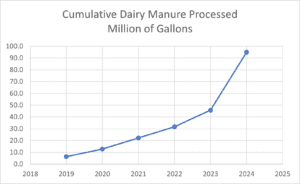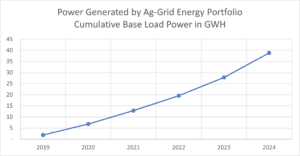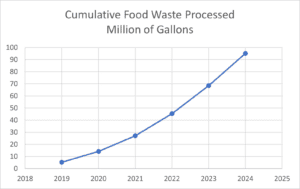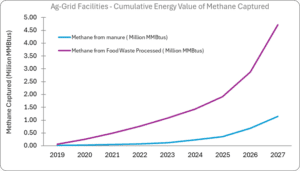In the past five years, Ag-Grid Energy’s five operating waste-to-energy facilities have produced 40 gigawatt hours of renewable electricity by processing 100 million gallons of cow manure and 100 million gallons of food waste.
These anaerobic digester facilities, developed in partnership with dairy farm owners, co-digest cow manure and locally produced food waste, thereby reducing the food waste burden on landfills. Ag-Grid facilities also have captured approximately two million MMBTUs of methane, a greenhouse gas that contributes to climate change.
“Five years of operational facilities is a big milestone that we are very proud of,” said Ag-Grid Energy CEO Rashi Akki. “By celebrating publicly, we intend to showcase the benefits of anaerobic digesters in mitigating greenhouse gases while creating financial sustainability for dairy farms.”
Ag-Grid Energy was founded in 2016 and its first two facilities began operating in 2019 in Massachusetts. The state had favorable food waste diversion laws that contributed to a clear business case for anaerobic digester projects. Ag-Grid’s leaders also had a passion for working with owners of small dairy farms (fewer than 500 cows) to help them increase financial stability.
The first four facilities reflect those priorities. Rockwood Ag-Grid in Granville, MA and Belden Ag-Grid in Hatfield, MA have been operating since July 2019. Next were two projects in neighboring Connecticut: Fort Hill Ag-Grid in Thompson, operational in January 2021, and Hytone Ag-Grid in Coventry, operational in March 2023.
“We are proud to say that Fort Hill Ag-Grid was the first farm digester in Connecticut to export renewable electricity,” Akki said.
Ag-Grid’s fifth – and largest – digester project is Lent Hill Ag-Grid in Cohocton, NY, a dairy with 4000 cows. New York state’s food waste diversion policies created a solid business case despite low electricity rates and lack of a clear clean-energy designation for digester projects.
Ag-Grid seeks to maximize benefits to dairy farm partners. Farmers share in profits from the sale of renewable energy, they can replace all or some purchased fossil-fuel-based fertilizer with organic digestate fertilizer containing nutrients captured from food waste, and they can use captured waste heat from digester engines to heat their barns and produce hot water for cleaning milking areas.
Ag-Grid’s five-year milestone of operational success has set the stage for current and future projects being developed in Michigan, Pennsylvania, New York, Texas and Connecticut. Working with partner UGI Energy Services as well as farm and banking partners, Ag-Grid leaders look forward to growing the company’s national footprint, accomplishing ambitious clean energy production goals, and not letting waste go to waste.




# # #